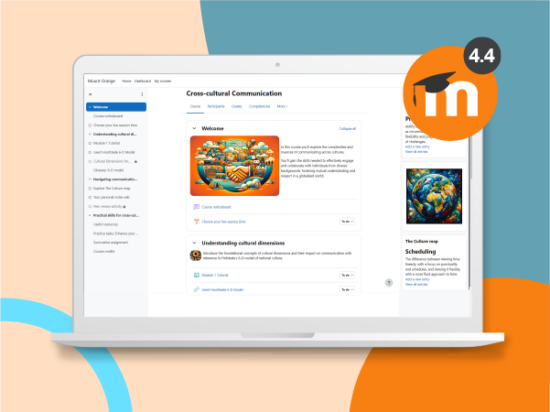Effective teaching methodologies play a significant role in shaping the development of educators and trainers while improving the learning experience for students. Educators and trainers in 238 countries trust Moodle as a preferred platform, as it provides security, flexibility and supports delivering active learning experiences that improve learner outcomes. Within Moodle’s global community, educators, trainers, and L&D professionals not only navigate the nuances of using Moodle as a toolbox to manage their online learning but also share ideas and develop their skills in implementing the best online teaching practices. In this article, we will explore how you can develop the best teaching practices on Moodle and how you can engage with the Moodle community to inform the development of your online teaching strategies.
The importance of best teaching practices: Learning theories and design principles
The dynamic landscape of education demands a continual adaptation to evolving factors, particularly with advancements in technology, student demographics, and changes in educational policies. Online teaching comes with a unique set of challenges as you must accommodate diverse groups of learners with different learning preferences and support enhancing the digital communication skills of your learners.
This is why educators and trainers have to be well-versed in learning theories and design principles.
Learning theories provide a deep understanding of how learners retain and recall information, as well as keeping them engaged and motivated. Comprising three main sections of behaviourism, cognitivism, and constructivism, along with emerging connectivism, these theories guide educators in tailoring their teaching approaches to meet diverse learning needs.
Behaviourism emphasises observable behaviours guiding strategies like positive reinforcement, while cognitivism explores mental processes, promoting critical thinking through techniques like concept mapping. Constructivism advocates for active knowledge construction through interactive experiences, and connectivism focuses on the significance of forming digital connections for enhanced learning experiences.
Learning design is a systematic and deliberate process that involves crafting learning experiences based on established theories or models. Learning designers employ a variety of learning models alongside popular instructional design frameworks, ensuring a comprehensive and effective approach. An effective learning design process transcends the limitations of a curriculum; it actively considers how individuals learn and determine which materials and technologies will be most effective in enhancing the learning experience.
How Moodle integrates the best teaching practices
Based on social constructivism, which states that knowledge is actively built through social interactions and collaboration, Moodle supports a collaborative teaching and learning experience. Optimal learning happens when you create or express something for others. Moodle provides all the opportunities for educators and trainers to learn from each other to provide the best learning experience to their learners.
Creating a roadmap for learning
Learning design encompasses the overall creation of engaging learning experiences. Instructional design, on the other hand, specifically concentrates on systematically planning and developing instructional materials and strategies for effective teaching. Moodle puts learners right in the centre of instructional design. It encourages interaction and collaboration among learners, while the educator or the trainer is put in a position to ask the right questions, prompting the learner to generate and locate knowledge and then apply it.
For instance, the ABC Learning Design team developed the ABC Moodle Tool Wheel, which maps Moodle tools and resources to support each learning preference, simplifying the selection of appropriate activities for each learner. Educators and trainers can easily identify and incorporate diverse learning preferences into their courses. This ensures that the courses align with the intended learning outcomes. The Moodle Academy team has been using this method to design free courses and programs on Moodle Academy, where you can access the short course that introduces you to ABC Learning Design.
Course design and development are non-linear processes, demanding iteration to align learning goals and materials with learners’ actual needs. The ADDIE model provides a clear course design framework, depicting five key phases—analysis, design, development, implementation, and evaluation. In this iterative approach, educators and trainers can continuously refine and enhance their courses with the evolving needs of their learners.
Collaborating with a learning designer can be beneficial for educators and trainers to create a learning roadmap. Learning designers stay informed about research and trends in education, which helps them shape effective learning models. Some of them are proficient in project management, which means they can work independently and oversee complex learning development and platform implementation projects. Learning designers can formulate comprehensive learning plans that detail the course topics, learning objectives, instructional methods, and assessment strategies. They also work closely with subject matter experts, trainers, and other stakeholders to ensure the training program meets the learners’ specific needs. Their expertise in learning design and instructional design significantly enhances the overall quality and effectiveness of educational initiatives.
Implementing UDL for a well-rounded learning experience
UDL (Universal Design Learning) aims at making education more inclusive and accessible for all learners. It revolves around three core principles – representation, action and expression, and means of engagement. UDL encourages educators and trainers to provide information in various formats, such as text, images, audio or video, to cater to a diverse style of learning. It allows learners to express their understanding and demonstrate their knowledge through different methods like written assignments, verbal presentations, and visual projects. Learners also have the option of varied approaches and choices in content and activities, as different learners may be motivated in different aspects of learning.
Implementing UDL in Moodle involves aligning the platform with the principles of multiple means of representation, action and expression, and engagement. Moodle empowers educators and trainers to create intentionally and meaningfully designed online learning environments that embrace social constructionist principles and UDL approaches. Through accessible text-based and audio-visual interactive resources, as well as collaborative features like chats, forums, and wikis, Moodle supports a diverse range of learning preferences. This integration helps educators in building inclusive and meaningful learning experiences, ensuring that every student has an equal opportunity to succeed.
Encouraging lifelong learning in a global community
In his keynote speech, ‘Lifelong learning’, during MoodleMoot Global 2023, Moodle’s Founder, Martin Dougiamas, emphasised the need to embrace learning throughout our lives for personal empowerment, to maintain currency of skills and to improve societal outcomes. This is particularly crucial for educators and trainers who must demonstrate a commitment and love of learning in order to facilitate learning in others.
Through the Moodle community, you can interact with other educators and trainers to share practical knowledge and ideas about the best teaching practices and stay up-to-date with the latest developments in education technology.
You can also attend webinars, complete courses, and enrol on programs on the Moodle Academy to enhance your professional career and learn what teaching practice works best for you.



